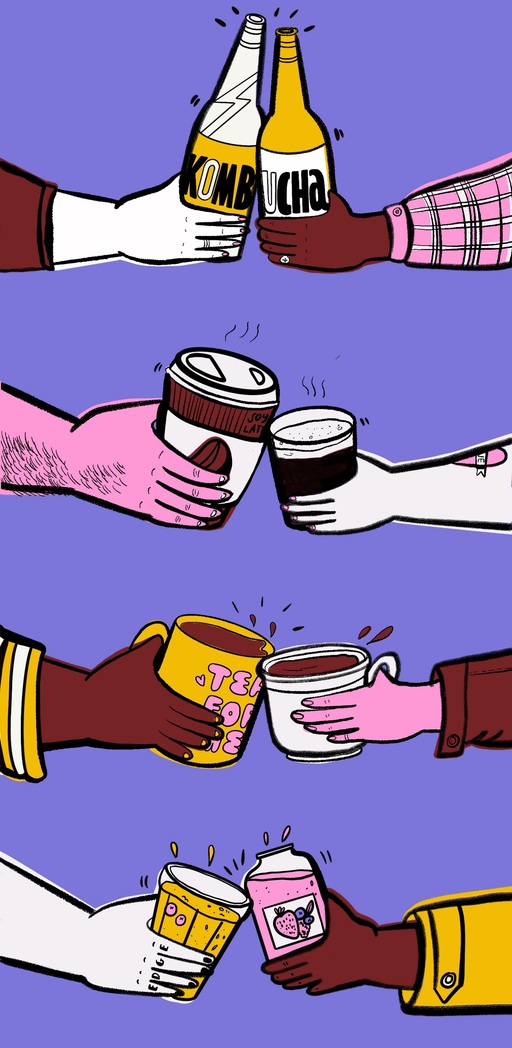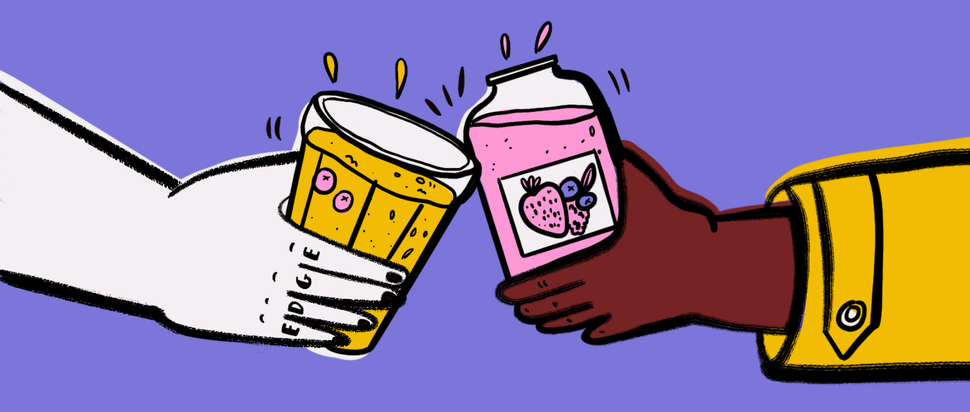Binge drinking, wellness culture & late-stage capitalism
As binge drinking rates fall and Gen Z swear off the booze, one writer explores the ramifications of a society going sober
With a history of problem drinking in my family, I was reluctant to hit the bottle throughout my teens. Only when I entered university for the first time and was confronted with the 'drink: or else' atmosphere of undergraduate life did I undergo my baptism into binge drinking culture. Despite initial reticence, however, alcohol very quickly became synonymous with socialising – my go-to for celebrating the highs, commiserating the lows and differentiating all the moments in between.
Yet as time went on, the drinking added up. It wasn’t just the mid-week hangovers at work, but smashing phones and losing house keys, as well as putting myself in increasingly dangerous situations. The temporary bluster provided by Dutch courage often led to behaviour I would never engage in sober; behaviour that would leave me cringing the next day, and often rightfully overwhelmed with shame. While the scenarios I’m describing might seem alarming, they’re probably familiar to many of the people reading as we’re encouraged to not give destructive drinking like this a second thought.
My experience is similar to that of many other Britons, with our love of the bottle positioning us as some of the heaviest drinkers in Europe. However, these attitudes are beginning to change, with millennials’ interest in alcohol progressively waning and Gen Z famously swearing off drink and drugs. In fact, recent years have even seen an aggressive decline in teenage drinking in Scotland, a country whose capacity for dangerous alcohol consumption has been well documented over the years.
What could be the cause of these changes? On the one hand, it’s likely a response to the fact that many millennials are now in their 30s, and are edging towards more sedate lifestyles as a result. On the other hand, it might have something to do with aggressive awareness campaigning on the part of the Scottish and UK governments over the past decade, giving younger generations a greater appreciation of the repercussions of habitual binge drinking.
While this might sound a bit preachy, it’s positive to see society’s reliance on alcohol coming under question. Yes, drinking can be fun, but it’s not always positive for the physical and mental health of everyone concerned. It’s heartening to see that younger generations aren’t facing as much stigma if they choose to abstain. After all, it should be a question of choice, with individuals suitably informed and free from pressure so as to make their own decisions about whether or not drinking is for them.
However, this decrease in drinking rates also goes hand-in-hand with the emergence of sobriety as a facet of 'wellness' lifestyles. After all, what’s the point of all those juice cleanses if you still drown your sorrows in a bottle of wine at the end of the week? Sobriety entails a further commitment to clean living, a step towards truly ridding your diet of toxins rather than waxing lyrical about the body benefits of veganism while still doing sustained damage to your liver. Yet is the championing of sobriety in wellness culture actually a positive thing? Clear links between wellness culture and disordered eating have been uncovered in recent years, particularly as the trend’s popularity on Instagram means that influencers’ seemingly perfect, 100% organic lives can feed nasty forms of health perfectionism in their followers.

Illustration: Jacky Sheridan
Sobriety’s proximity to wellness culture positions it as yet another fad contributing to obsessively high health standards, standards that could easily morph into feelings of superiority to those who choose to drink. With its increasingly aggressive focus on wellbeing and mindfulness, society is moving closer and closer towards a new health puritanism that could foster a climate of shame for those who don’t jump on the bandwagon. Already we can see that the language of sexual moralism, revolving around purity, cleanliness and what’s 'natural' has been appropriated by wellness. Just as concerns about smoking often speak in moralistic tones of the collective harms of second-hand fumes, the conversation about sobriety might well begin to place drinking in opposition to civility, painting the alcohol drinker as a burden on the health service and society at large.
Wellness culture (and even certain elements of the self-care movement) emerge from late-stage capitalism and its constant imperative to hustle non-stop and then side-hustle some more. The fact that self-worth is so often measured in productivity places an impetus on individuals to work past the boundary of what their body might naturally be able to tolerate. In this light, the fixation on health becomes just another way of ensuring that we can support this constant grind to continue being model workers.
Alcohol, on the other hand, does the opposite: making us sluggish, out of control and often physically ill. To revel in the joys of alcohol-fuelled vice, then, is to reject this capitalistic emphasis on civility and professionalism. In times where enjoyment is replaced by its mere imitation on social media and where brands are so entrenched in each stage of our leisure and pleasure time, unabashed hedonism might well be one of the last vestiges of resistance we have left.
However, it’s important to emphasise that drinking (or drugs, smoking, and junk food for that matter) isn’t for everyone, and no one should feel like they have to drink themselves into oblivion each and every Saturday night. On the other hand, we shouldn’t have to give up all forms of self-indulgence in order to squeeze ourselves into some capitalist mould or further accommodate a working culture that jeopardises our well-being.
There needs to be a mid-point where we can critically examine our social and cultural relationships towards alcohol, as well as our own reactions to it, to forge healthier attitudes and coping patterns. Alcohol shouldn’t be perceived as innately harmful, nor should the opportunities it presents for socialising and escapism be dismissed out of hand. Rather than jumping to accept second hand generalisations, we should be allowed to forge our own informed decisions about alcohol and not be shamed either way.
